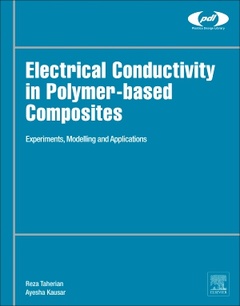Description
Electrical Conductivity in Polymer-Based Composites
Experiments, Modelling, and Applications
Plastics Design Library Series
Authors: Taherian Reza, Kausar Ayesha
Language: English
Subjects for Electrical Conductivity in Polymer-Based Composites:
Keywords
Analytical modeling; Band theory; Bulk conductivity; Carbon; Ceramics; Composite; Composite bipolar plate; Composites; Conductive paste; Conductive polymers; Contact resistance; Corona; Determining electrical conductivity; Dielectric composite; Dielectric constant; Dielectrics; Electric field; Electrical conductivity; Electrical properties; Formulation; Four probe; Functionalization; Gas diffusion layer; Graphite; High-voltage transportation; Insulators; Magnetic field; Material selection; Materials; Metallic bipolar plate; Metals; Microfiller; Mixing method; Nanocarbon; Nanocomposite; Nanofillers; PEM fuel cell; PTC; Percolation threshold; Permeability; Permittivity; Polarizations; Polymer; Polymer-based composites; Polymer/carbon composite; Polymers; Proton exchange membrane fuel cell; Strength electronic; Surface conductivity; Temperature; Two probe
432 p. · 15x22.8 cm · Hardback
Description
/li>Contents
/li>Readership
/li>Biography
/li>Comment
/li>
Electrical Conductivity in Polymer-Based Composites: Experiments, Modelling and Applications offers detailed information on all aspects of conductive composites. These composites offer many benefits in comparison to traditional conductive materials, and have a broad range of applications, including electronic packaging, capacitors, thermistors, fuel cell devices, dielectrics, piezoelectric functions and ferroelectric memories. Sections cover the theory of electrical conductivity and the different categories of conductive composites, describing percolation threshold, tunneling effect and other phenomena in the field. Subsequent chapters present thorough coverage of the key phases in the development and use of conductive composites, including manufacturing methods, external parameters, applications, modelling and testing methods. This is an essential source of information for materials scientists and engineers working in the fields of polymer technology, processing and engineering, enabling them to improve manufacture and testing methods, and to benefit fully from applications. The book also provides industrial and academic researchers with a comprehensive and up-to-date understanding of conductive composites and related issues.
1. Introduction2. The Theory of Electrical Conductivity3. Conductive Composites4. Manufacturing Methods of Conductive Composites5. The External Fields in Conductive Composites6. The Applications of Conductive Composites7. The Modelling of Electrical Conductivity in Composites8. Testing Methods of Conductive Composites
Materials scientists and engineers in the fields of polymer technology, processing, and engineering, in industrial research and academia.
Reza Taherian received his PhD in Materials Engineering from Shiraz University in 2011. His research interests and related publication works center on carbon-polymer composites, with investigations of their porosity, conductivity, and mechanical and thermal properties. For Elsevier, he has previously authored Electrical Conductivity in Polymer-Based Composites (2018). Alongside his research activity, which has brought him to be recognized among the world’s top 2% scientists in 2020, he collaborated to a patent for a compound formula for brake pads that has since been made commercially available for various aircraft models.
Dr. Ayesha Kausar is a professional scientist at Pakistan's National Centre for Physics in Islamabad. She previously worked at the National University of Sciences and Technology in Islamabad, Pakistan, as well as Quaid-i-Azam University. She obtained her PhD from Quaid-i-Azam University, Islamabad, Pakistan/KAIST (Korea Advanced Institute of Science & Technology), at the Graduate School of EEWS, Daejeon, Republic of Korea.
Her current research interests include the design, fabrication, characterization, and exploration of the structure-property relationships and potential future prospects for nanocomposites, polymeric nanocomposites, polymeric composites, polymeric nanoparticles, polymer dots, nanocarbon materials (graphene and its derivatives, fullerene, carbon nanotube, fullerene, nanodiamond, carbon nano-onion, carbon nanocoil, carbon nanobelt, carbon nanodisk, carbon dot, and other nanocarbons), hybrid materials, eco-friendly materials, nanocomposite nanofibers, and nano-foam architectures.
- Explains the methods used in the manufacture and testing of conductive composites, and in the modeling of electrical conductivity
- Contains specialized information on the full range of applications for conductive composites, including conductive adhesives or pastes
- Brings scientists, engineers and researchers up-to-date with the latest advances in the field
These books may interest you

Nanofibers of Conjugated Polymers 135.96 €

Lignocellulosic Composite Materials 210.99 €


